Interview with Ute Allenberg, a BDM member (Bund Deutscher Mädel, or League of German Girls), Glaube und Schönheit (Faith and Beauty) model, wife of an SS man and bombing survivor. Frankfurt, 1988.
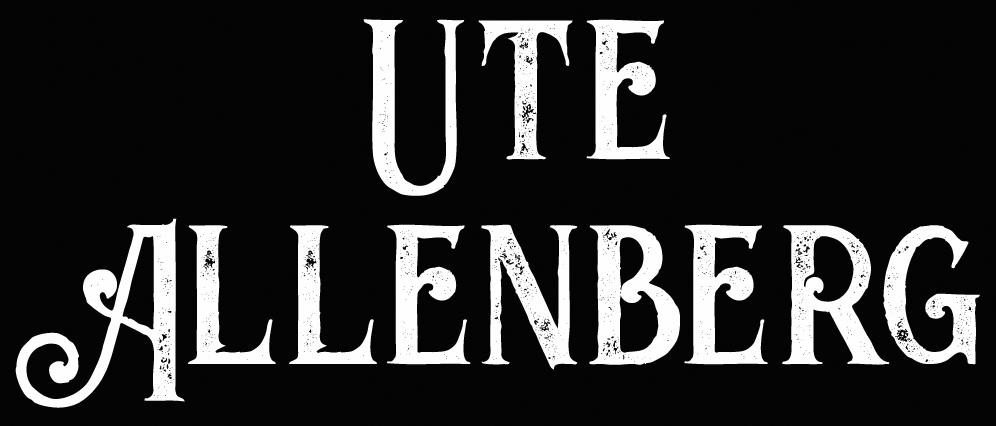
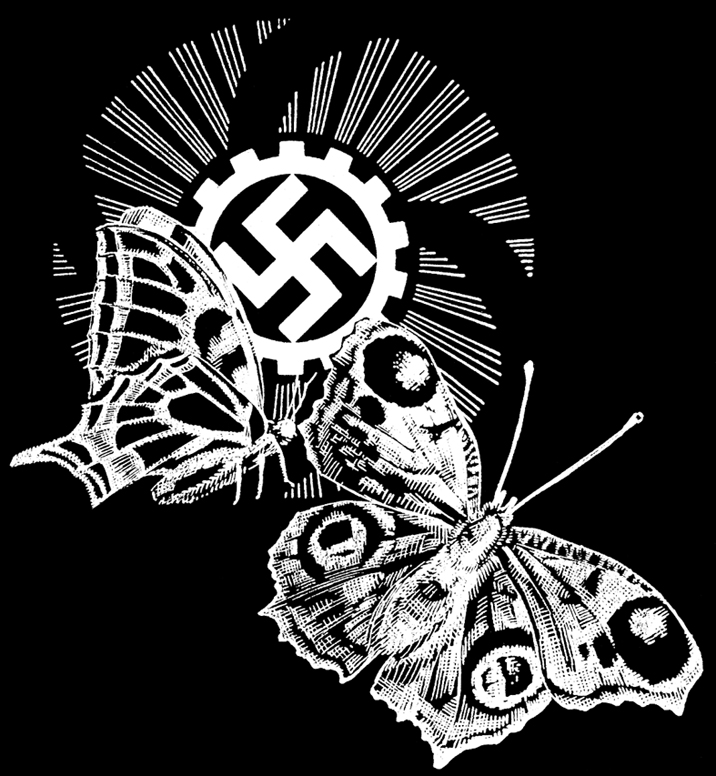
Interview with Ute Allenberg, a BDM member (Bund Deutscher Mädel, or League of German Girls), Glaube und Schönheit (Faith and Beauty) model, wife of an SS man and bombing survivor. Frankfurt, 1988.


Ute: Oh that’s easy to answer, it was a good time for me back then, and things were always so cheerful and enthusiastic. I came to the BDM in 1935; my parents were early supporters of Hitler and allowed me to join. Not every girl was part of this, some did not believe in it. I personally felt like I was part of something very special. We wore uniforms of black skirts, or very dark blue, white blouses, and a tan jacket. I remember my mother taking me to the Party store to buy it. Since she was a member and wore her badge, we received a good price. It seems so silly now, but I remember putting everything on and then going for a stroll by the river.
I remember some HJ [Hitler Youth] boys walking by and giving the Hitler greeting to me. I had a big smile on my face as I returned it to them, thus was the power of a uniform. We did not wear the armband we had a small youth flag sewn on our sleeve instead. In the summer we just wore the white blouse without the jacket. As far as what it was like for me, we would meet and do girl things. We made clothes and practiced plays or worked on school work. We did many activities outdoors, like hiking, learning about nature and doing gardens. We were taught to become self-sufficient with food, back then you ate many things you grew. Singing and studying was a big part of the BDM, you had to maintain good grades to be able to stay in the special groups. We had different areas where one could be a part of. If you were a good singer, you could join the choir; a good runner could join a field team.
I must say too that health was important, we were taught about vitamins, good eating habits, and exercise. It seemed like we were always doing some type of warm up, running, or agility drills. My main interest was fashion back then. I really liked clothes and shoes, so I was part of a sewing group. It was nice having the training to be able to make outfits, as my parents could not afford all the clothes I wanted. I decided I would try to get work in that industry, which was becoming very big in Germany. My leader saw my enthusiasm and she put me in touch with a trade group of women and suggested I start working with them. This was in 1937, and I was in my last year of school and the BDM. As I said my leader had me working with ladies from the Faith and Beauty organization. They helped sponsor fashion shows and trade fairs. I was able to do modeling for a few of the clothing designers here in Frankfurt. I was at a trade show for clothes makers in 1938 where I met my husband.
He was in the black SS and was wearing his duty uniform, he looked very handsome. I was sitting with a friend at her booth and he came up to ask my name. He was 2 years older than me, but since I was 18 my parents could not say much about us going on a date. I remember it like it was yesterday. We went to the movies on a Saturday, and then had a nice dinner. He showed me around his barracks, and I met his friends. They teased him about being outclassed with me; it was all in good fun. He would ask me to attend dances and dinner parties his company would hold and I would bring my best friend Lorelei. Since I was 18 I was also not part of the BDM any longer and became part of the Faith and Beauty ladies. We put on many shows for the women, to show ways to dress smart, wear hair, and make-up tips. I did not see my man as often as I would have liked, he was part of the Austria and Czech reunions. In 1939 he came home and proposed to me, which I accepted.
We were married in 1939, right before the start of the war. It had taken awhile as the SS had screenings for the prospective wives. Can you imagine? I had to go through a process just to say I was worthy of marrying someone from the SS. They made me submit our family tree so they could see if we were really Germans.
I took it with a grain of salt; I know Himmler wanted his men to only marry pure German girls for the blood to be kept pure. I thought the BDM was a well-oiled organization, the SS was even more so. I was befriended by many of the wives of his comrades and we often times would hold dinner parties, or ladies nights.
I remember going to Paris with Lorelei in 1939, and buying good fashion items and bringing them back to show. I would be utilized to help pick out proper outfits for the ladies. Even the ones for the husbands liking, but I should not share that with you.
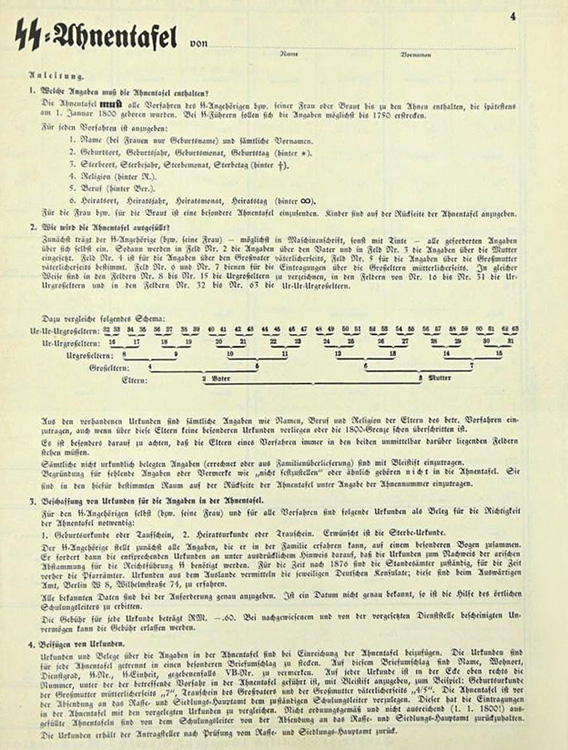
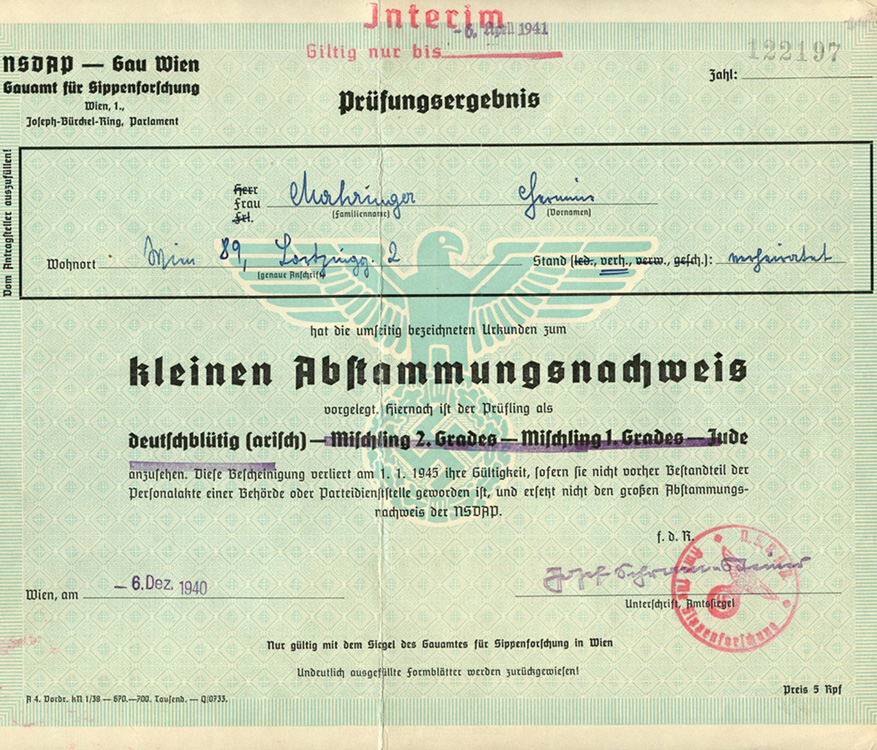
[Above: (left) An 'SS-Ahnentafel' (SS-pedigree) form and NSDAP 'Prüfungsergebnis' (examination result), or 'kleinen Abstammungsnachweis' (small proof of descent) certificate.]
Ute: Yes, being around the wives and girlfriends of soldiers, I can assure you it was worrisome. I remember there being a lot of praying and hoping for a good outcome. My man had told me there were problems with Poland, and the press reported about attacks on the border. I later learned that Germans inside Poland were persecuted which made things worse. All the military was put on alert, I remember, and they started making us turn off lights at night. There were a couple of scares, I believe, where planes flew overhead and it was thought they would bomb the city. Some areas close to Frankfurt were bombed in 1939 and 1940.
I was working at the time with textile mills to select fabric for the clothes makers. This work I enjoyed and it took my mind off the war. We read that there had been attacks in the west that were beaten back, and Poland fell quickly, that put us at ease more. My man was part of the actions against the French in 1940 and was wounded at the end.
He came home in July 1940 to rest and get well and was given a long leave. It was nice for us then. We believed the war was won and peace would soon return. This was not to be sadly. In 1941 he was away for action in the east and the war was getting bigger.
Frankfurt was not a big industrial center, which was more up north. But the British did attack us. I had our first child in 1940 and stopped working to be a mother.
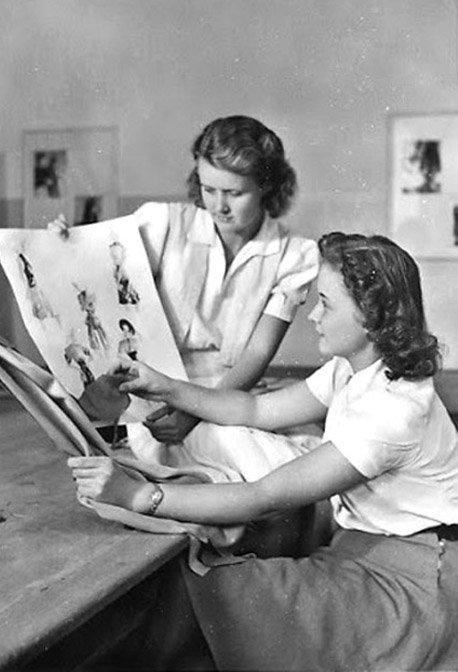
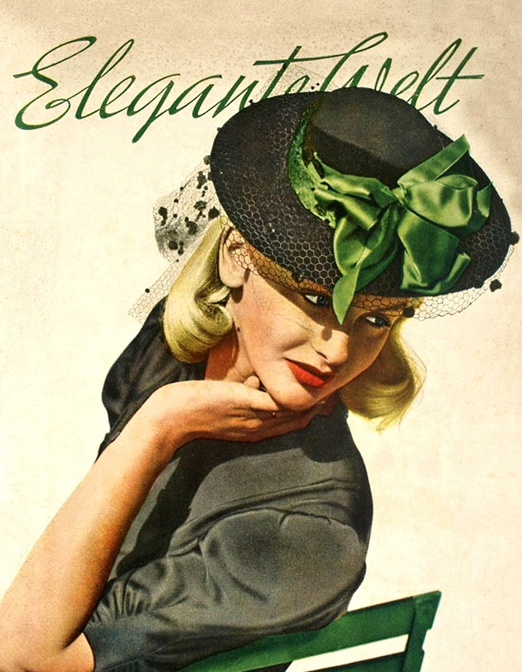
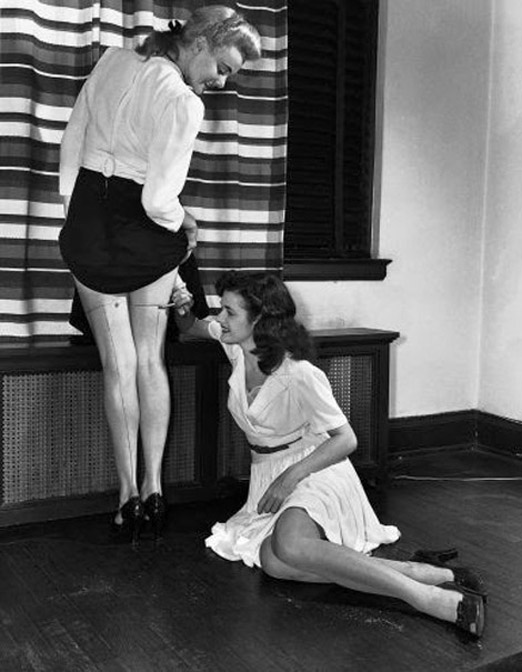
[Above: (left) Women of 'Faith and Beauty' studying fashion design, (center) a page from a German fashion magazine from the period and two German girls marking stockings.]
Ute: Yes, they were terrifying, I can tell you. I remember it was in 1943 and I was pregnant with our second child. I grew up living close to the university and river. My parents had to come live with us in 1942 as their home took damage. The SS provided married couples with an affordable home and if you had children it would become free after you had so many. We lived on the outskirts of the city, so I felt somewhat safe from bombs. We did have a cellar in the back where we could go for shelter. Our air raid warden was a Party leader and he was very strict. I remember one night I was feeding my son when the sirens went off.
I had left a light on and he came to the door and insisted we all go take shelter and to turn off the damn light, as he put it. We would get warnings all the time that they became very annoying. Later in the war, they seemed to go off fairly often. It affected the sleep and morale for many people; I could not imagine having to go to work in the morning after a full night of sirens. We would all crowd in the cellar and I could hear the bombers, they had a low drone sound. The guns would fire at them and you could not be out since the pieces could fall down on you. The bombs would come down and the earth shook under us. You could hear the explosions and the air filled with smoke and a funny smell of the bombs. My city was bombed very badly so that by 1944 it was a moonscape in some places. Right down the street from our home there was a bomb that did not explode. It was a big job to do for the men who came to disarm it. Everyone had to get away.
I had classmates who died during these attacks and I would attend the services if I was able. It was very hard raising two children during the war, food was disrupted, we would have no power, and water was also a problem. In the end it was very bad and people were dying due to not having food or medicine.
I was lucky in that my father was part of the university and he was able to save some of the food meant for the students and staff for us. I did not know this until after the war, but he would keep back things that would last for awhile, and bring them to us to eat. It helped supplement our rations.
We had extra cheese, bread and eggs, so that way the children did not go hungry. We of course shared with everyone as well, but it did run out when the Americans came. For the whole month of May it was very bad for everyone. It was not until June that they brought in food and repaired water lines.
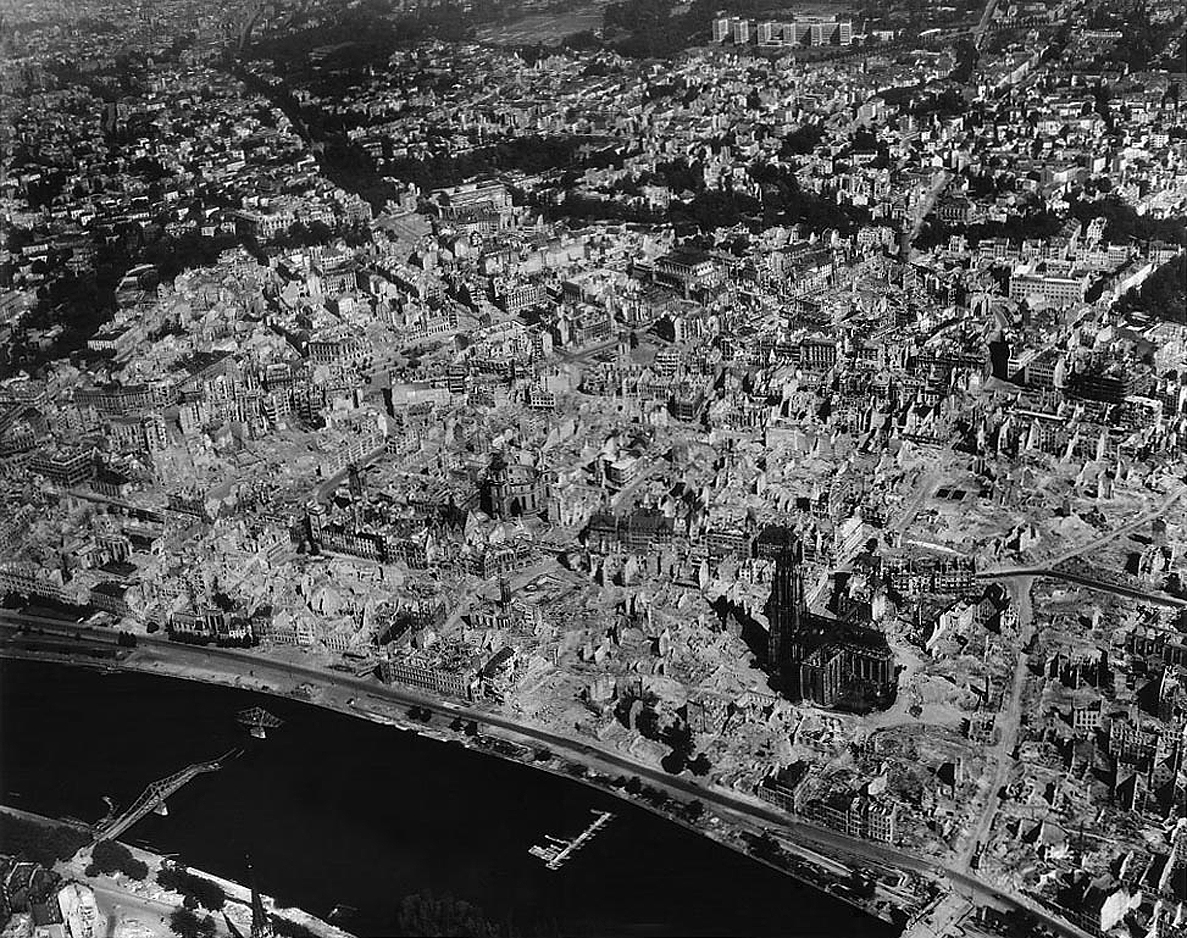
[Above: Frankfurt in June 1945 showing the untold destruction caused by Allied 'Terrorangriffe" (terror attacks) on civilians.]
Ute: I never saw anything like what you are describing. It was treason to aid the enemy during the war and would bring severe punishment. Hitler did many great things for Germany; the war took away those achievements. I will tell you the people were loyal to the very end, it was not until the Americans arrived that the tune changed. You have to understand the Americans were very harsh to us and anyone who was part of the Party was taken away. If someone was in any way a part of an organization then they had a hard time with the [Allied 'de-Nazification'] courts that we all had to go through. That was when I heard mumblings about Hitler and the party. I remember they also brought back many expelled people who became quite powerful. They had signs put up everywhere saying Hitler was to blame for all the destruction and we were to blame for the camps and what happened.
I had to go help clean up rubble on some days as did my father. I remember they burned their party cards so they were not identified as fanatics. Do not get me wrong, there were many loyal people to Hitler, as there are today still. One had to be smart in order to survive. This is why so many Germans fled to other nations.
Germany became an occupied country and many wanted to not live under the occupation. My man had a friend who lost his whole family; he joined the foreign legion in 1948 and fought in Africa. Another friend left for South America where there were friendly governments.
We stayed here in Frankfurt, my man came home in 1947, and we started a new life from the old. He was never ashamed of his time in the SS, and stayed in contact with his comrades until he died. They were a special group of men, loyal until the very end. The Americans punished many of them and kept them as prisoners for a long time.
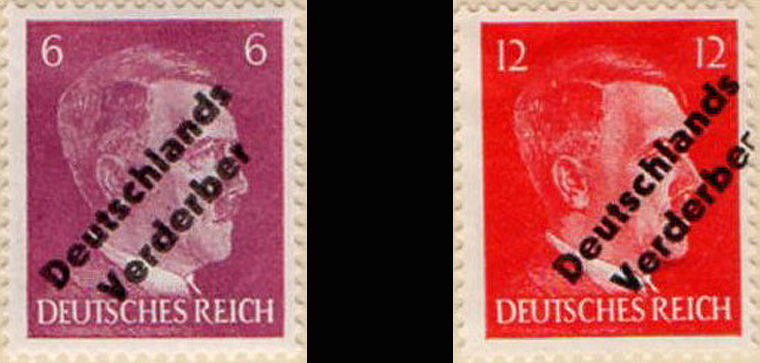
[Above: Allied overprint calling Hitler 'Germany's Destroyer'. And here I thought it was the murderous rain of bombs dropped on millions of civilians by the Allies! Or the massive rape gangs that raped over one million German women. Or the 10-12 million Germans who were murdered AFTER the war by the Allies.]
Ute: He would only say the Allies were liars and controlled by the Jews. He seemed angrier at them after the war than before. He did not like the Jews, I will tell you. He said before the war they were a people he ignored. He always joked about the ideology classes the SS put on, saying they were boring. After the war, he said he understood them better. To him the Allies were pawns of powerful Jewish people in the east and west. He never believed them when they would write about their time in the camps and what happened. He said it was all lies and made up stories.
He would say if they wanted to kill the Jews, then why did so many survive? He had friends in the Totenkopf Regiment who were at the camps and told him their stories. They said any Jew who was sent to a camp was treated very well and was never abused. I know many were left alone during the war; we had a Jewish area here that was left alone. It all makes no sense to me and all that the war gave us was a divided former Reich. We are now East/West and parts of the East are still not rebuilt. He was always angry at the stories told in the press about the former Waffen-SS killing prisoners and civilians. He said they never did any of those things and it was just political enemies coming forward with made up tales. He said any battlefield killings would have been a reprisal for something someone did to them first.